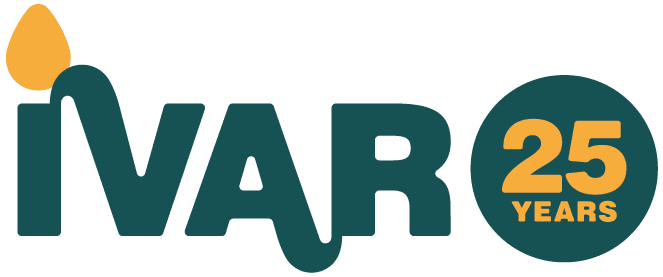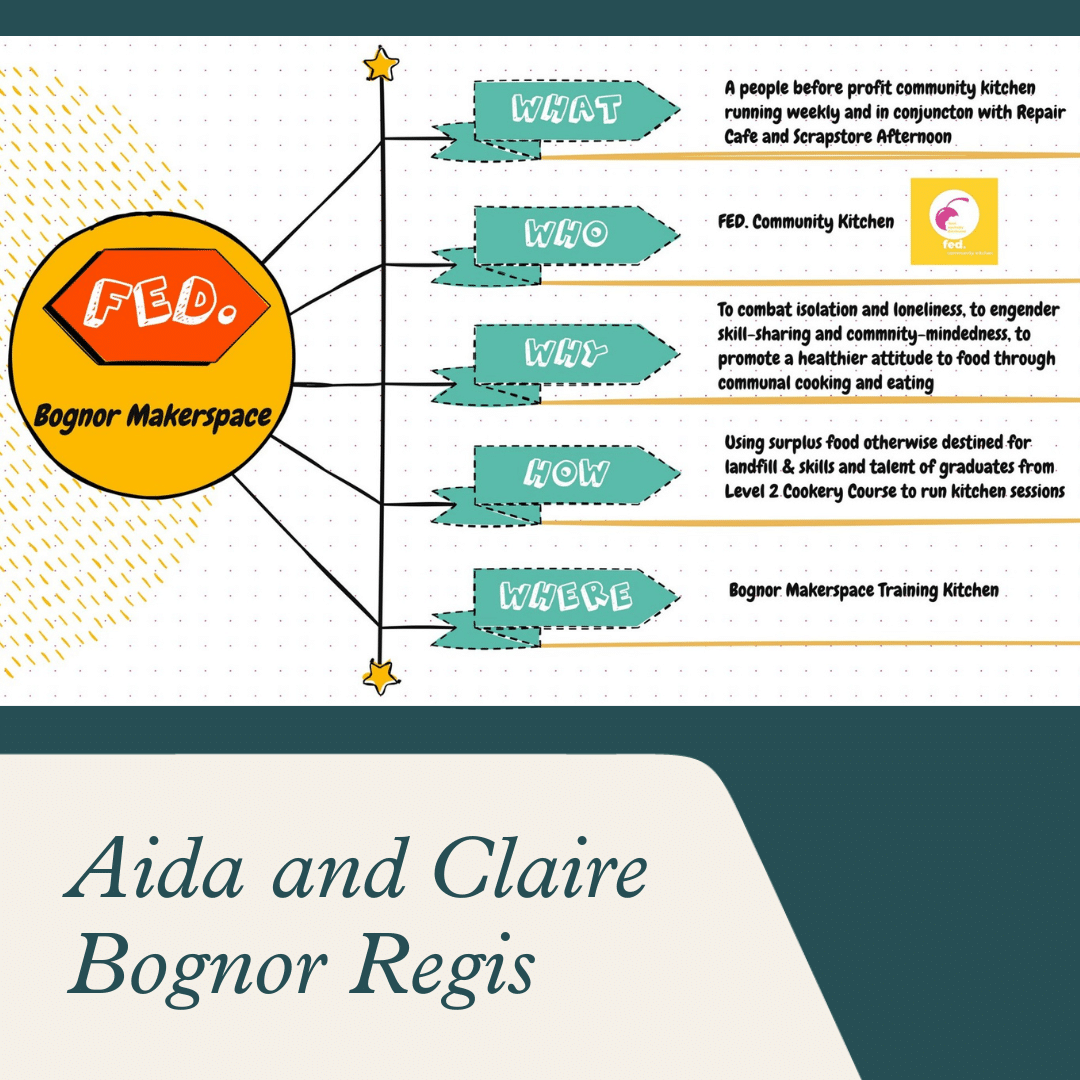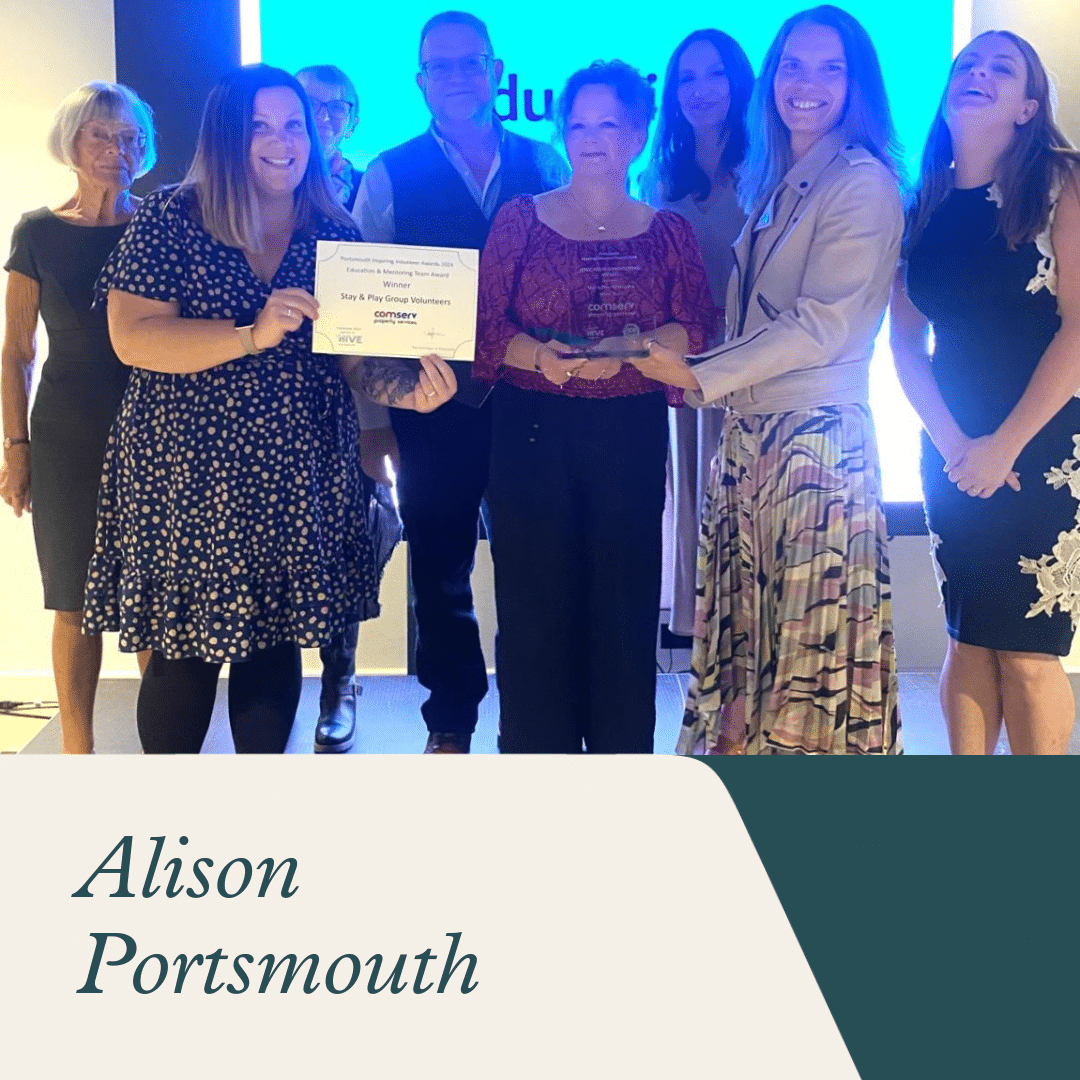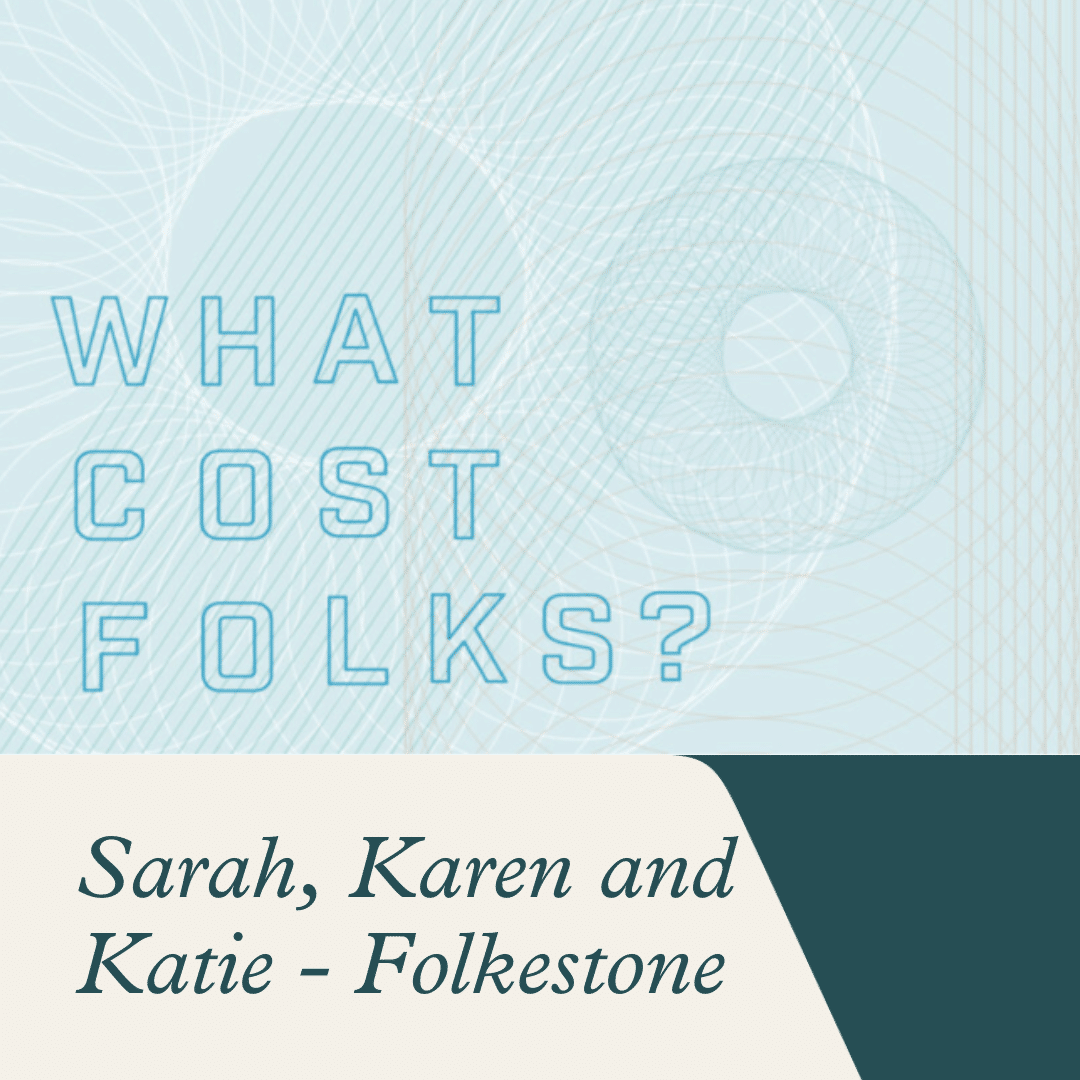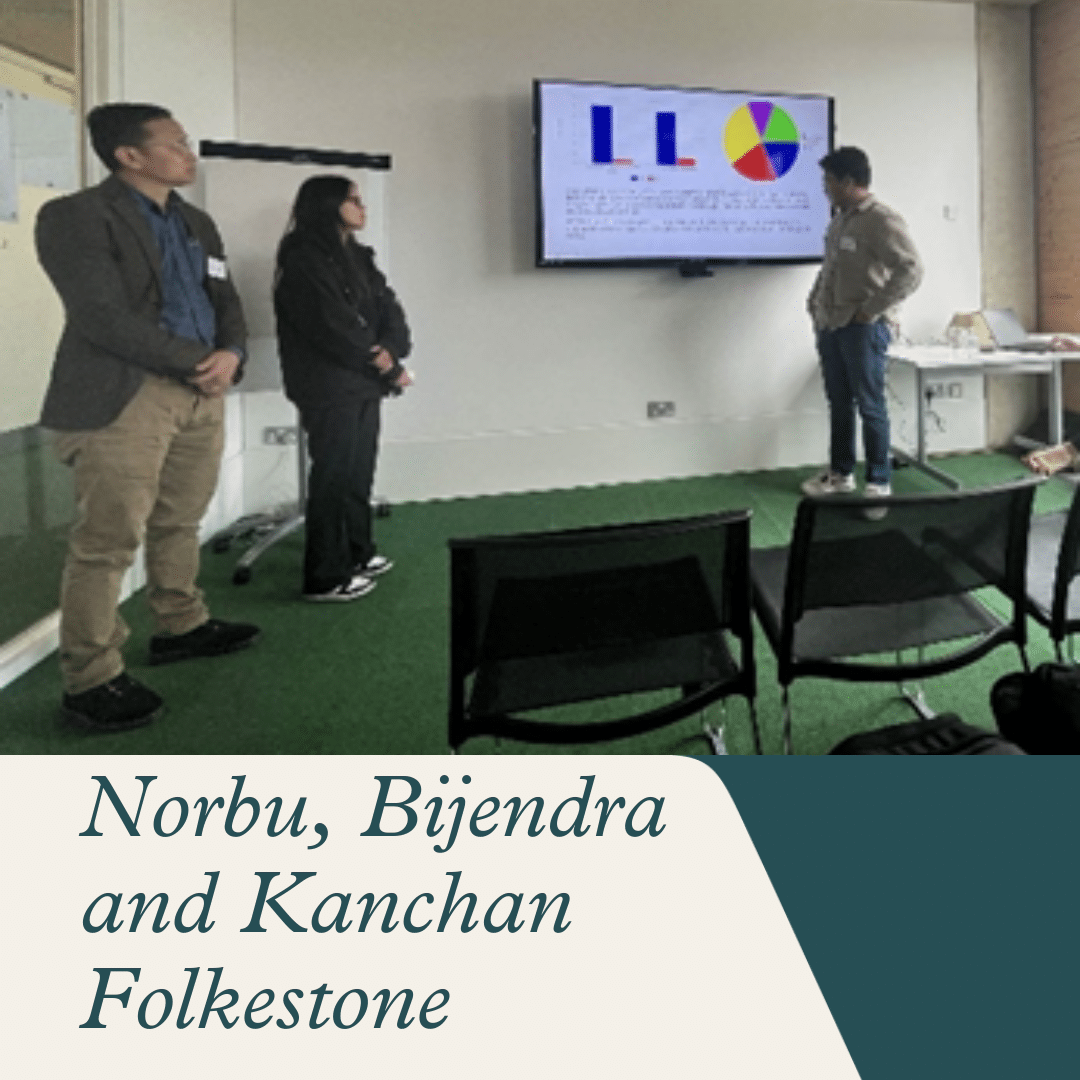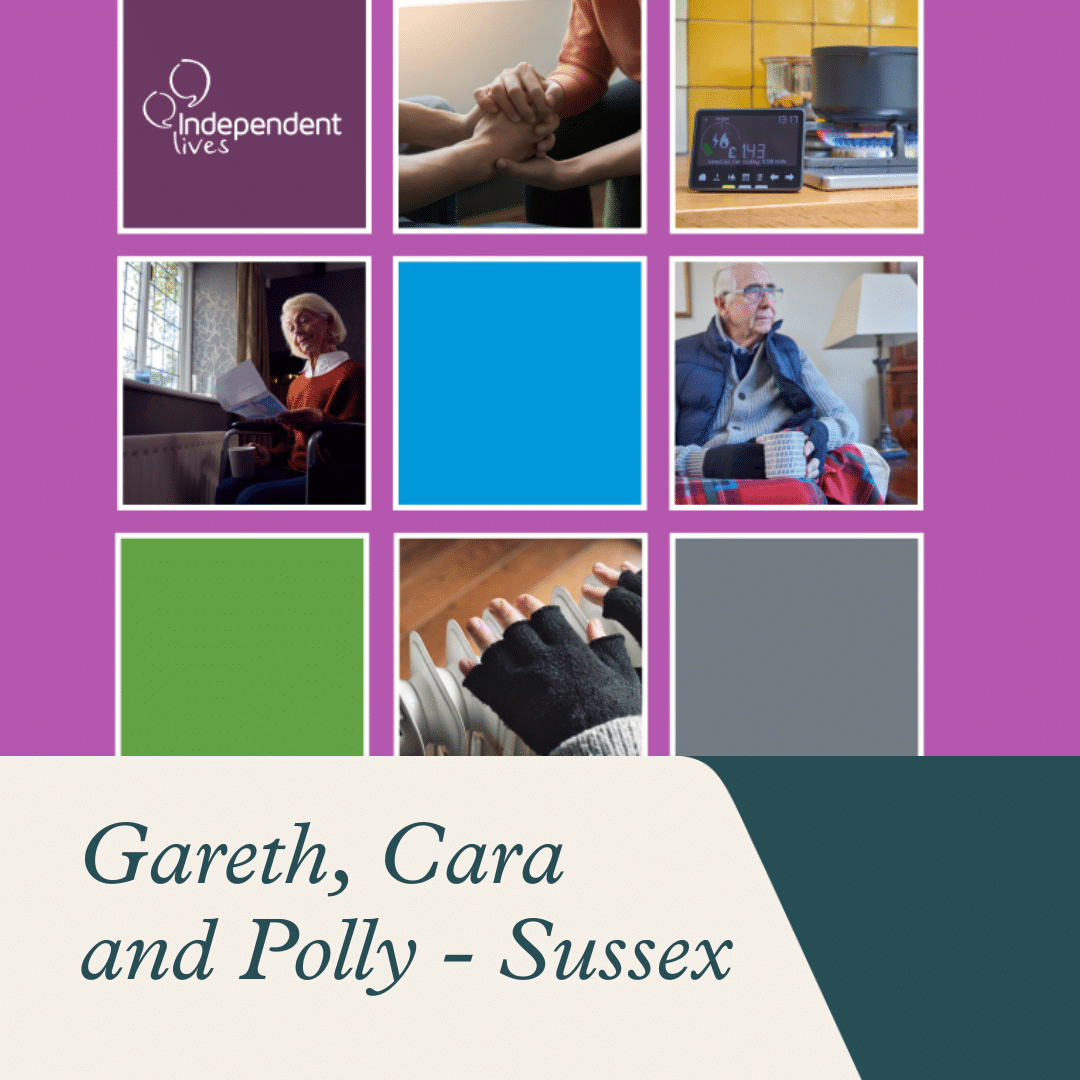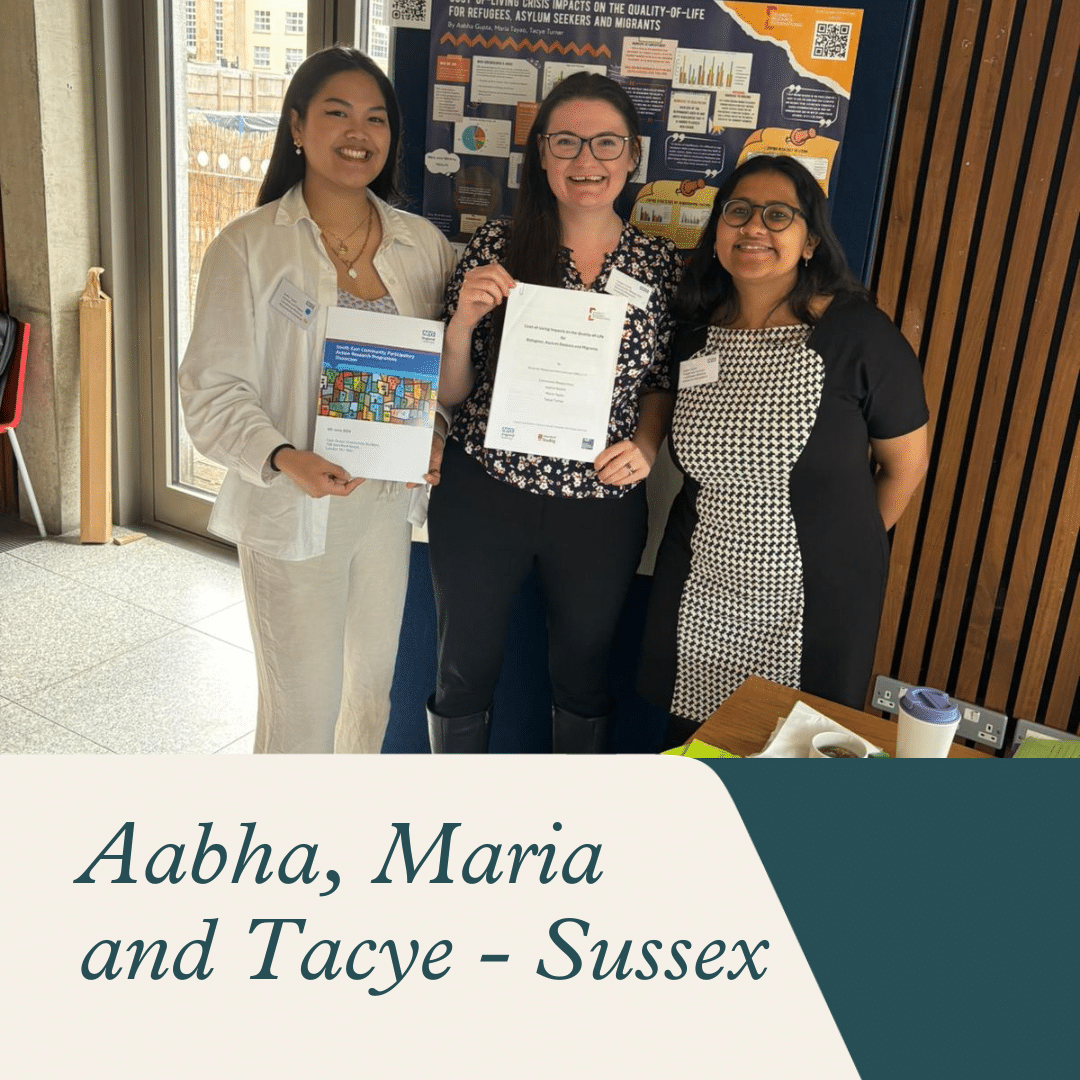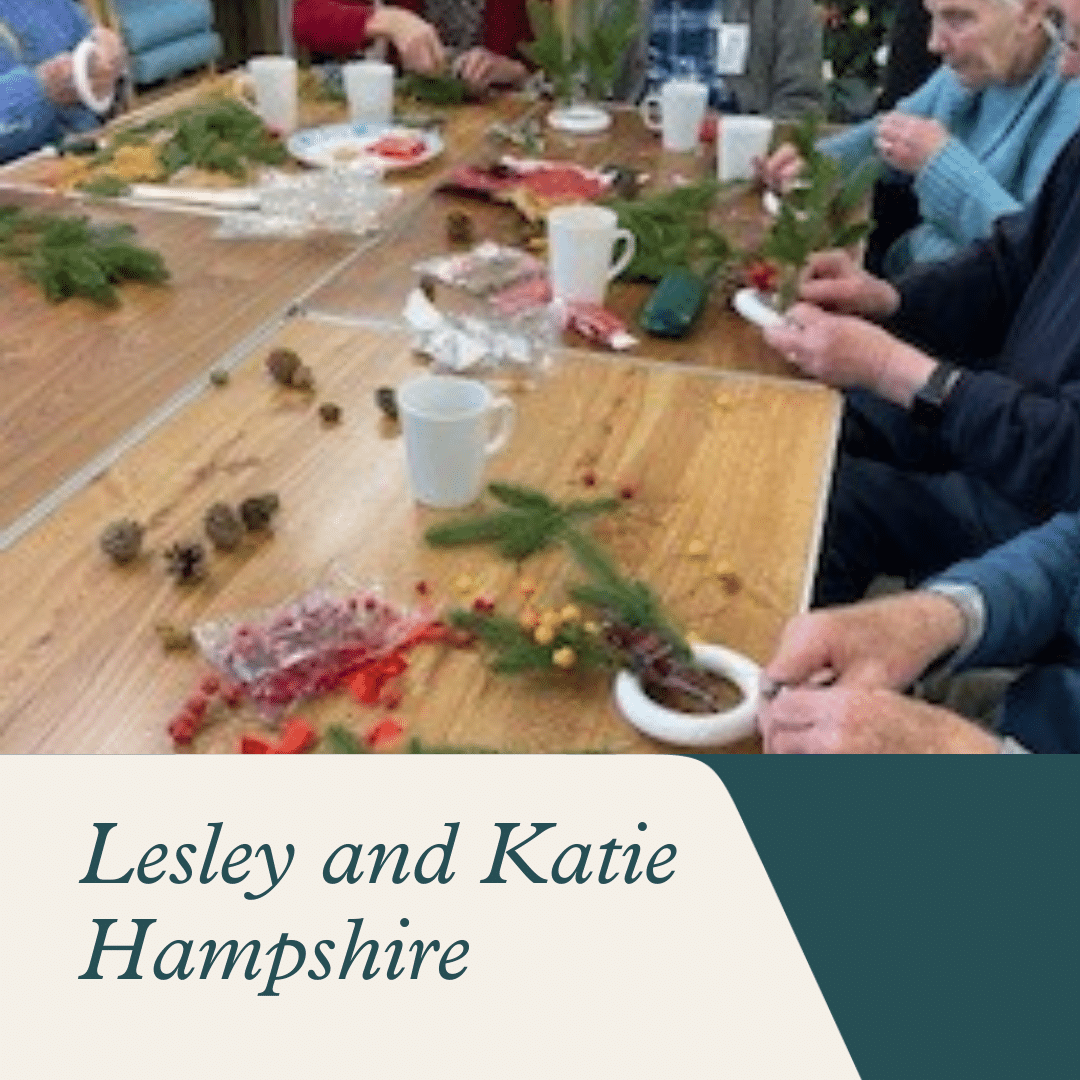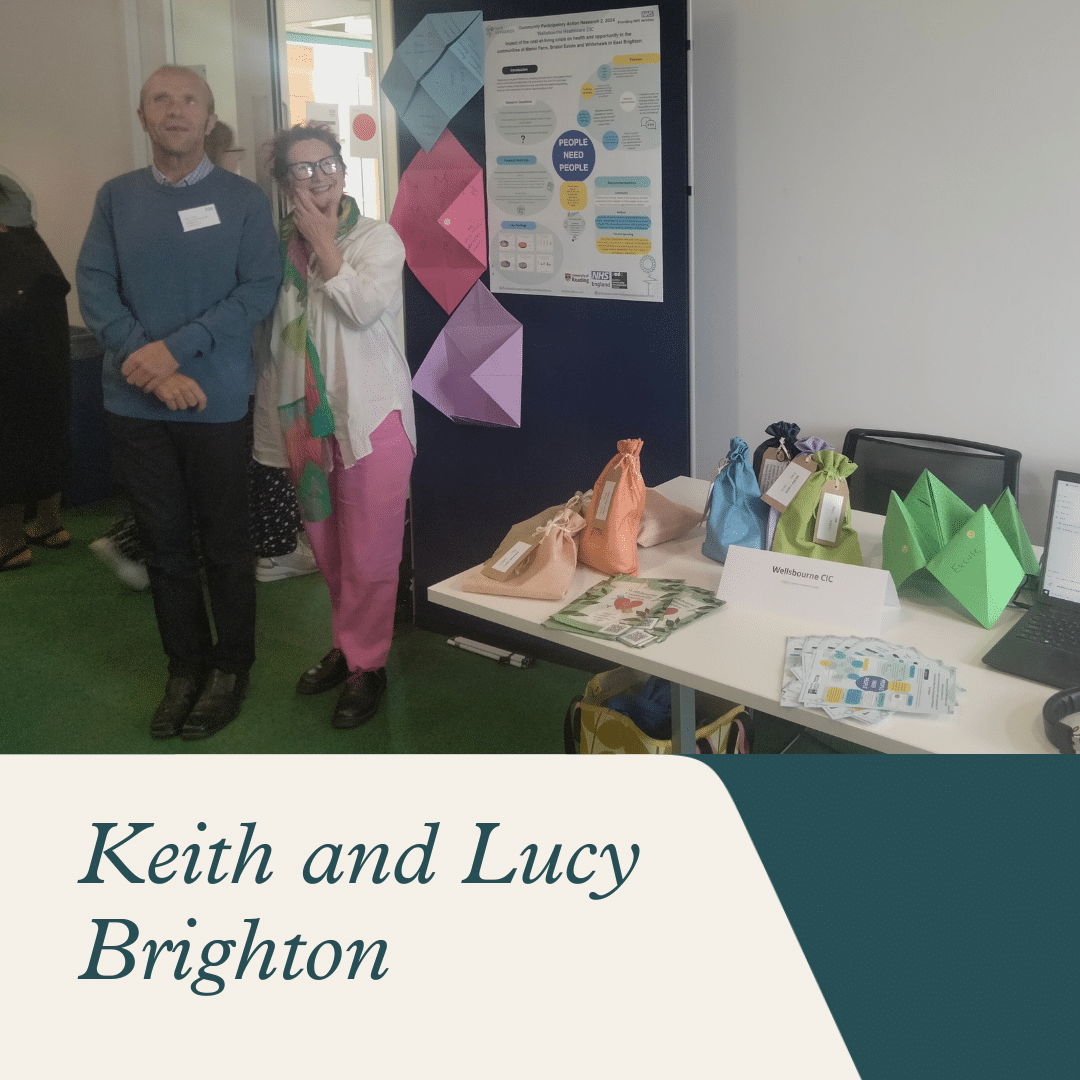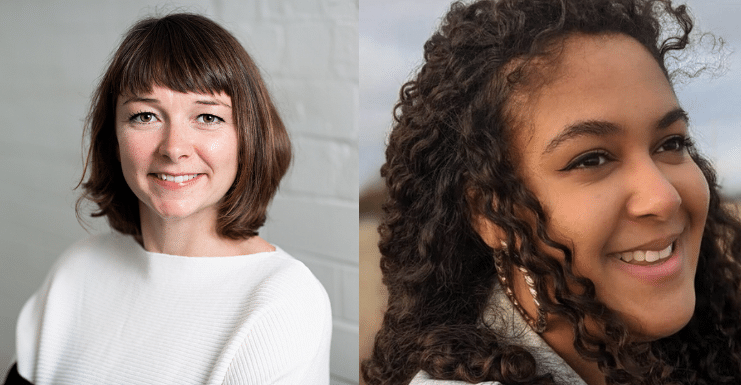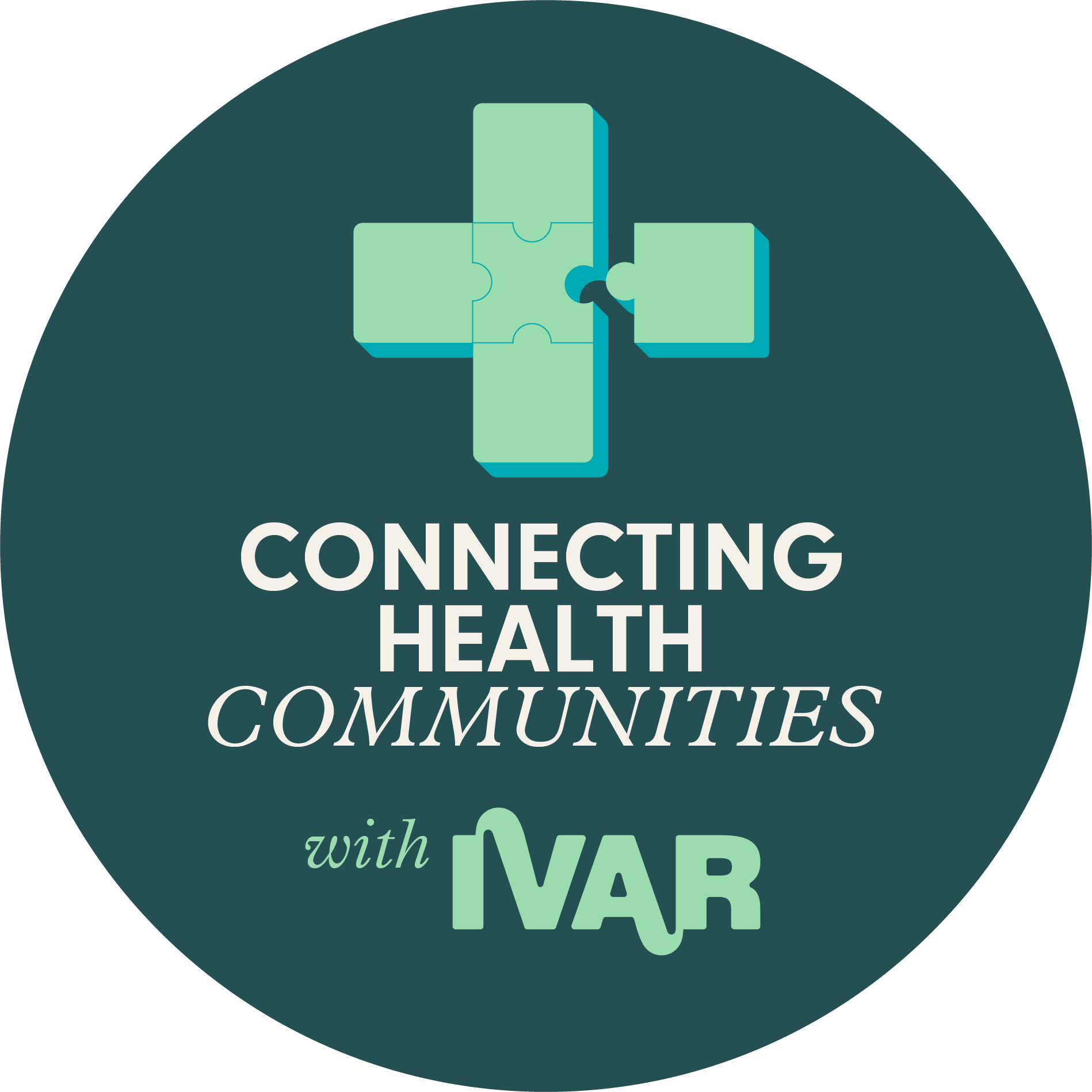Building effective health and care solutions or services that address complex community needs and challenges requires the integration of diverse perspectives, particularly from those at the heart of the communities affected. Between April and October 2024, we worked with 29 community researchers from South East England to help them identify how their research can inform and influence the priorities, policies and development of health services for marginalised communities in South East England and support them in sharing these recommendations with stakeholders.
There are two main takeaways from this work:
The positionality of the community researchers
Community researchers, often embedded within and trusted by their communities, bring invaluable insights, lived experiences, and action-oriented approaches to collaborative efforts. They possess ‘the ability to listen to communities,’ translating their deep local knowledge into practical recommendations that resonate with those they serve. They provide unique access to underrepresented voices, leveraging their trusted positions to amplify concerns and opportunities within marginalised groups. This positionality is critical in ensuring that solutions are inclusive and representative.
Their contributions extend beyond identifying problems; they are action-focused and committed to implementing the changes their communities need. As community researchers aptly reflected, their work is underpinned by ‘passion and care’ and ‘a desire to make a difference’, showcasing their commitment to creating tangible change.
Call for partnership and collaboration
By those responsible for designing and delivering local services working alongside communities and investing in community led research, we have seen how this leads to services that are more responsive to and reflective of local needs.
Community researchers bring a wealth of assets – local knowledge, research skills, and strong networks. One of the community researchers shared – ‘I am connected to the community, its networks, and the place’ a testament to the indispensable role these individuals play in crafting solutions that truly resonate.
To build partnerships, stakeholders need to move beyond a top-down approach. Prioritising co-production and treating community researchers as equals rather than mere informants encourages an environment where joint problem-solving can thrive.
The two blogs dive deeper into the unique strengths of community researchers and why working in partnership with them leads to impactful, community-driven solutions. They share learning on how stakeholders can engage meaningfully with communities to create lasting impact.
The value of community researchers
The community researchers produced rich and varied research outputs, and many have started taking action to create change in their communities. In addition to the benefits for their organisations and community members, the researchers also honed their research skills, built confidence, and broadened their connections to key stakeholders in their areas. This blog post shares learning and inspiration from the researchers involved in the programme.
Click to read the blog
Building effective partnerships with community researchers: What local stakeholders need to know
We conducted workshops on action planning and helped community researchers to share key messages and recommendations from their research; delivered a webinar on effective partnership working and facilitated stakeholder workshops to share insights and encourage discussions on collaborative solutions. This blog shares key insights and our learning on how local authorities, healthcare organisations, and other local stakeholders can build partnerships with community researchers and contribute to the collaborative process.
Click to read the blog
Building effective partnerships with community researchers: What local stakeholders need to know
Written by Sonakshi Anand
Value community organisations and their ability to ‘listen to communities’
For effective partnerships, recognising the critical role community organisations play in sharing community knowledge about particular needs as they are the ‘trusted organisations’ in the community. The practical knowledge community researchers bring is invaluable, particularly when navigating complex issues like cost-of-living impacts on health and well-being. Community researchers often represent and live within the communities they serve, giving them unique perspectives that traditional data may overlook. By incorporating this lived experience, partnerships can avoid duplication and design services that are truly responsive to community needs.
‘It is all about connecting around something that you want to work on together, setting aside the constraints that prevent partnership working like budgets, systems etc.’
Equal partnerships and co-production
Approach community organisations as equal partners rather than merely sources of information. Instead of ‘researching’ communities from a distance, stakeholders should actively co-produce solutions with them. This shift demands a commitment to genuine involvement in every step of the process, from research design to implementation of solutions with resourcing for partnership working.
‘Working with stakeholders is all about wanting to connect with each other to make a change, to think about working ‘with’ not ‘doing to’ or not ‘doing for’ so having a receptive attitude and really valuing each other.’
Simplify processes and improve system navigation
Local decision-making structures are often complex and can seem opaque to community organisations and navigating healthcare and local government services can be overwhelming, particularly for marginalised communities. Community researchers have expressed the need for ‘simplified systems that can ease the administrative burden’ and improve clarity around services. Make systems more accessible through streamlining processes, using simplified language, have direct points of contact and share the local systems and roles with community researchers for better engagement.
‘We need ICB leads to introduce themselves to VCSE leads, what their roles are and how they can help.’
Ensure long-term commitment and funding
Long-term, flexible funding is crucial for community-driven projects. Many community organisations operate under resource constraints and need consistent financial support to make lasting impacts. Stakeholders can ease this burden by collaborating on joint funding applications, pooling resources, or exploring joint-funded roles across sectors.
‘There is a need for longer-term funding solutions and greater collaboration among local organisations to create more stable and effective support networks.’
Explore if existing pots of money can be used more creatively to support proactive care. Honest interactions are needed, and local authorities need to look at what voluntary organisations are doing and understand why. Commissioners and organisations need to work together to look at how money is being used and look for gaps of how services are being delivered and the perceptions of users. It may be helpful to develop some principles for commissioning services.
Provide actionable solutions, not just research
Community members are wary of being over-researched without seeing concrete outcomes. There is ‘tiredness’ felt by communities who have participated in many research studies without subsequent actions. Actions are critical to maintaining trust and engagement, and community organisations work towards these with the community. Stakeholders should align with this approach by committing to implementing the insights gathered through research, even if in small, incremental ways.
‘Community researchers are action-oriented and focused on creating tangible change.’
Identify existing volunteer or community-led programs that could provide critical support with minimal funding. Limited funding means relying on creative, community-driven solutions, with the voluntary sector’s unique skills and resources playing a key role. Community leaders are
‘There are solutions in the voluntary sector that might be more cost-effective, providing support.’
Facilitate ownership and skill development in communities
Stakeholders are encouraged to invest in community ownership of projects. By enabling communities to shape, participate in, and eventually lead initiatives, stakeholders help foster self-reliance, resilience and a more organic, inclusive model of engagement.
‘One of the key things is to identify those in the community who want to give more to their community, have the confidence to share their skills and are comfortable doing this. They can become the trusted linked in the community and we can work with them to build ownership.’
Engaging trusted individuals or community champions within communities who can act as connectors and advocates, who can rally others and act as a bridge between organisations and community members, is highly effective. These individuals help build trust, increase engagement, strengthen community bones and ensure that solutions are culturally appropriate. Community researchers often act as champions themselves, promoting not only research findings but also community needs and concerns while enabling ongoing learning and contribution.
Call to Action
Collaborating with community researchers requires a shift from traditional, top-down approaches to a model that values shared knowledge, mutual respect, and long-term investment.
‘In addressing health and social challenges, particularly responding to the cost-of-living crisis, there is an urgent need for genuine partnership.’
For stakeholders, this means bringing not only resources but also an open, adaptable mindset to the table, clear communication, simplifying engagement processes and a commitment to sustainable, community-driven solutions. Partnerships grounded in transparency, mutual respect, and shared responsibility stand a greater chance of transforming community health outcomes and empowering residents long-term. Below is the call to action for stakeholders interested in empowering communities to address challenges effectively.
Practical actions for stakeholders
Apply for funding bids as a cross-sector partnership in collaboration with community researchers and voluntary organisations to ensure the sustainability of services in the long run. Explore pooled budgets and joint-funded roles across health and social care to create a more cohesive support system for communities.
Better signposting: Send online and hard copy directories with information about the various groups and free offers available to ensure people know what’s happening in their area. Build a central website or directory to facilitate referrals across the county, particularly ensuring referrals are warmer and more optimal than simply signposting.
Visit community organisations in your area and learn about the services they provide ‘for mutual learning and improvement of services.’ Support health champions from the voluntary sector and ‘be the voice of change in your organisations’ emphasising the need for cross-sector collaboration.
Work in partnership with community leaders and researchers who are trusted partners in the community for greater impact and engagement with communities. Provide letters of support from councils for voluntary organisations and their work could help with funding applications.
Create a shared online platform or forum for the voluntary sector and local authorities to connect and work together.
Convene conversations about existing and new commissioning services and explore what is working and where are the gaps
The value of community researchers
Written by Alex Parker
What it means to be a community researcher
‘We bring solidarity, working together and partnership.’ – Community Researcher
Community researchers participating in the programme grew their confidence in doing research and sharing findings with the community and local stakeholders. They expressed the strength that came from representing their organisations and the importance of networking and connections. They also, drew inspiration by working together as a team and chatting with peers.
Some felt disheartened as times that they need to continue to have their roles recognised:
‘Still feel marginalised – we need to continuously fight to represent the community.’ – Community Researcher
Together, the community researchers developed a set of mantras to remind themselves of their value in the quest for positive change in their communities:
- I am sharing the voices of my community
- I have a passion to help others
- I have built relationships of trust
- I have worked collaboratively
- I am connected to the community, its networks, and the place
- I speak well on behalf my community with research evidence
What community researchers bring to the table
While community researchers learnt new skills through their research journeys, they also came to the work with skills and a position within and knowledge of their communities. Community researchers bring:
- Insights: Credible research and recommendations from the community.
- Access: Able to talk to community members directly, speak on their behalf or bring them into a conversation.
- Communication: Feedback directly to the community about system-level actions/discussions that affect them.
- Positionality: A focus on reaching people whose voices are underrepresented.
- Action focused: Commitment to see change happen within their communities off the back of research they are involved in.
- Asset based approach: Recognition of the skills, knowledge and expertise in communities.
‘I learnt that my volunteering role provided me with participants who already had a rapport with and trust in me.’ – Community Researcher
What does it mean be a leader?
Community researchers often do not see themselves as system leaders, believing that any successes they achieve are due to working behind the scenes by doing research for example, rather than leading from the front.
But given the unprecedented challenges facing the NHS, we need community researchers to recognise themselves as leaders. They can influence ‘systems’ or organisations like the local NHS organisations or local authority by sharing their research and recommendations and motivating to work differently, across service and organisational boundaries towards meeting community needs.
Leadership through skills development
Leadership skills are often developed through the experience gained from conducting research. Our community researchers learnt a wide range of skills beginning with the research methods such as interviewing, managing people, video editing, and learning about different types of research outputs.
Researchers also learnt to make difficult decisions and to talk about their research succinctly and with credibility. Researchers felt empowered to share their research findings and recommendations with people who can drive change in their communities. They shared that research is not always easy but that it taught them about instilling hope with their research participants and community members.
“I learnt how working with a team can be less isolating and make work easier, especially a team with the same aims.” – Community Researcher
“I have brought knowledge of the area and some services that might be useful.” – Community Researcher
“I have brought passion and care to the project and a desire to make a difference.” – Community Researcher
“I have brought an open mind to listen to our community and to help address their needs and concerns through the research.” – Community Researcher
Bridging Research and Action
Empowering community researchers to lead local change for their communities
Read about the journeys of some of the community researchers. Their narratives are a testament to the dedication and resilience of individuals committed to improving the lives of their neighbours and building healthier, more inclusive communities. They highlight the power of community-driven research and its potential to address inequities in health services, by ensuring that the voices of underrepresented groups shape the policies and practices that affect them and to create lasting, equitable change.
Building community cohesion through communal dining
Aida Kaman and Claire Ockwell’s research report titled, ‘Mind the Gap’ explored the impact of the cost of living crisis on people using Bognor Regis Foodbank. They conducted interviews and a survey among clients of the food bank. These provided significant insights into the challenges their community faces, highlighting four key findings:
- Need for financial support: Clients expressed a need for increased financial support, specifically through Universal Credit, citing a £30 monthly shortfall in basic living expenses for single individuals: ‘Benefits to be escalated to a payment that will not leave me in this position.’
- Fragmented support services: Clients felt that local support services feel fragmented, hindering their effectiveness and there is a need for better pathways to access support needed: ‘You get passed around so many people’.
- Lack of resilience amidst the cost-of-living crisis: Clients reported struggles with resilience due to added stress due to financial instability and the isolation exacerbated by the COVID-19 pandemic: ‘This crisis has strained communal bonds, with a decline in kindness, collective support and sensitivity.’
- Food apathy resulting from food insecurity: Many community members have a limited engagement with food preparation and healthy eating. They are unfamiliar with cooking techniques and tend to avoid fresh, nutritious options, instead prefer ultra-processed items like instant noodles, biscuits, and chocolate. ‘Surplus fruits and vegetables from food banks often go to waste because clients lack the skills, equipment, knowledge and or confidence to prepare them.’
Aida’s journey
Since completing this research, Aida has been working as a well-being facilitator at Bognor Makerspace, where she has been providing cookery courses that enable individuals to obtain Level 2 Food Hygiene certification. The main finding, Aida is keen to address is ‘community food apathy and building resilience within the community members.’
Vision
Aida remembers reactions of community members when they were asked to share their fondest childhood memory of their favourite meal: ‘I could see the change in people – they’d be smiling and recalling a better time, forgetting all stresses they mentioned. It’s always some family setting where there’s been communal eating involved and fond memories of sitting down enjoying a meal together with people that they know and actually trust or love.’
Her vision for this work is ‘to establish a community kitchen and a community café’ within Bognor Marketplace, alongside the planned repair café. Both of which could operate on a skill-sharing model with volunteers leading the work. She suggests that community members graduating from these cookery courses would use their skills to prepare meals using surplus food items sourced from local organisations such as a community café.
‘This initiative would create opportunities for communal dining, foster skills development, and reinforce community cohesion.’
Proposed approach
Learning from numerous projects such as the slow cooker programme funded by the Sussex Community fund, that provided families with slow cookers and weekly ingredients to foster cooking from scratch; repurposing surplus food into nutritious frozen meals for the community, supporting local homeless charities and collaborating with community groups on food-related initiatives, she proposes the following approach:
- Reducing food apathy: By engaging individuals in meal preparation, the aim is to shift their attitudes towards food, demonstrating its value beyond mere convenience.
- Communal meal initiative: Participants would cook and share a nutritious, homemade meal as a part of the community cafe:
‘Our intent is to avoid processed foods, offering a delicious and wholesome dining experience for 12 to 20 people, with the potential to scale up.’
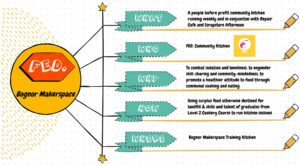
Possible outcomes
Community resilience
This proposed project addresses both food insecurity and community isolation by empowering individuals with skills they need to enhance their own lives and the lives of others, while helping them build resilience towards food apathy. The community kitchen will provide a supportive, skillbuilding environment that nurtures both individual resilience and a collective sense of purpose.
‘Our goal is to cultivate a thriving community where individuals contribute actively, rediscover self-sufficiency, and reduce dependence on food banks as a long-term support mechanism.’
Working with communities
‘We can’t keep giving people more money because there isn’t any money.’
With limited resources all around, skills and asking people to volunteer their time to build community resilience is the way forward. To help the communities thrive, and more members of a community who are resourceful, ones who have skills, need to be encouraged to get involved in the community.
‘We need to pick out the ones who got the skills and teach them to teach others and so on, this cycle continues ensuring sustainability.’
Aida plans to launch this community kitchen by January, a time when community engagement typically wanes and this is her ask from stakeholders:
‘I invite stakeholders to support our efforts in creating a self-sustaining, resilient community that thrives beyond crisis intervention.’
Advocating for happiness: Alison’s journey from a volunteer to a community researcher
Alison started volunteering with Home-Start Portsmouth in 2021 after learning about the organisation through being a member of the Portsmouth Parent Board since 2019. She helps run a weekly ‘Stay and Play’ session for parents with children aged 0-5. The group offers a supportive space for fun activities and social interaction. When the opportunity arose for Home-Start Portsmouth, in collaboration with Portsmouth City Council, to facilitate the CPAR 2 project, Alison was selected as a community researcher.
Focus of the research
Alison decided to look into how the cost-of-living crisis was affecting Portsmouth families’ health and happiness after hearing parents’ concerns about rising costs and expenses during the ‘Stay and Play’ sessions. After the lockdown, she noticed that many parents were feeling anxious due to financial struggles. Motivated by these observations, Alison conducted surveys, focus groups and interviews among local parents. The results showed that many parents were experiencing significant financial stress, which was affecting their emotional, mental, and physical well-being.
Key findings
The research revealed that the majority of parents felt the cost-of-living crisis was negatively impacting their health and happiness. Although fewer parents reported that their children were affected, many noted that they were actively trying to shield them from the situation. Feelings of guilt were common, particularly when parents had to deny their children previously affordable treats. To highlight a few key findings:
- Emotional and physical health concerns: Many parents reported that financial stress was affecting their mental and physical health, leading to increased worry and anxiety.
- Challenges accessing services: Parents frequently expressed frustration when attempting to make medical appointments, and many struggled to navigate the resources available to them.
- Happiness was seen as being important to individuals and the family unit and that trying to achieve it shouldn’t be seen as an act of entitlement or that it is a luxury for the few.
- Lack of affordable dental care: A considerable number of parents faced difficulties accessing affordable dental services: ‘I have spent more on my recent treatment than we did on our wedding’.
Overall, Alison’s research highlighted the need for better access to support services and information, as well as the importance of addressing the broader systemic issues exacerbated by the cost-of-living crisis.
Proactive steps taken to drive change
In response to these findings, Alison has taken the following action to influence and address the challenges faced by families in Portsmouth:
Community engagement and resource sharing
She has created a Facebook page dedicated to sharing local services, resources, and activities for families. She has started developing a website to provide a comprehensive platform for families seeking support. She has shared the research findings with Healthwatch Portsmouth, Portsmouth City Council’s public health team, and via social media. She has also launched efforts to expand the visibility of her research by displaying her poster at conferences, community events and at the Home-Start Portsmouth Office. In this year, the poster will be ‘going on tour’ by being shown in the family hubs, libraries and other public spaces.
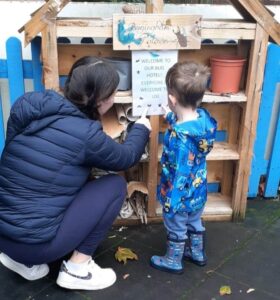

Some fun activities at Outdoor Explorers
Research and collaboration
She is working on the Health and Care Portsmouth community research project called 1001 Days research project, which examines the first 1,001 days of parenthood – from conception to age two – to ensure that services align with family needs. Through her work with Healthwatch Portsmouth, Alison has been gathering direct feedback from parents to influence health-related decision-making and improve service delivery across Hampshire. Her insights have also been incorporated into new social work training programmes and shared with the Portsmouth City Council’s Energise Me team, who may use the findings to support an upcoming funding bid.
Career development
Alison is working with the newly formed Portsmouth Health Determinants Research Collaboration (Portsmouth City Council, University of Portsmouth and Hive charity), developing and then carrying out their first community research project. This will be looking at what makes a positive learning environment for early language, from both the perspective of professionals working with families and parents. She has been awarded a ‘Research In Your Career’ grant that will be used over 12 months, supporting her work and development linked to this project.
Training and outreach
She has coordinated training sessions through the Money and Pensions Service on the ‘Talk, Learn, Do’ programme, which aims to help parents openly discuss budgeting and financial responsibility with their children. With sessions scheduled for next April, followed by workshops designed to equip parents with the skills needed to discuss financial matters with their children. In the interim, she has been sharing online resources to help families navigate financial challenges, directly addressing parents’ concerns about the impact of the cost-of- living crisis on their children.
Charting the course for change
Looking to the future and the changes she would like to:
Advocate for service improvement
Alison aspires to influence local policies and practices to bring about meaningful change. She aims to tackle funding and resource limitations by working collaboratively with community partners and stakeholders, fostering a culture of openness and adaptability. Through continued engagement and a commitment to advocacy, Alison hopes to drive positive change for families across her community.
Advocate for improved services and more accessible resources
Alison is committed to ensuring that every family has the opportunity to achieve a sense of happiness and fulfilment by addressing gaps in service accessibility.
Influence systemic challenges
Alison seeks to overcome these challenges, for example, funding limitations and resource constraints by promoting collaboration, mutual respect, and a shared commitment to making a meaningful difference for the community.
‘Working with stakeholders is all about wanting to connect with each other to make a change, to think about working ‘with’ not ‘doing to’ or not ‘doing for’ so having a receptive attitude and really valuing each other.’
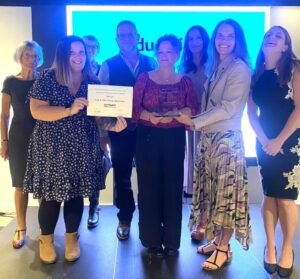
Alison receiving a Portsmouth Inspirational Volunteer award on behalf of all the Home-Start Portsmouth Stay & Play volunteers.
Community research: A conduit for creative research methods
What Cost Folks? was a community action research project run by Sarah Lloyd, Karen Pamplin Browne and Katie Lambert at Fourth Wall Folkestone. The project explored the impact of the cost-of-living crisis on the wellbeing and mental health of the Folkestone community by using creative research methods as tools to generate questions and understand issues in the community. The research culminated in a final exhibition and film that showed their findings and identified the actions the community want to be taken to improve their mental health and wellbeing, particularly during the cost-of-living crisis.
The research
Fourth Wall Folkestone’s research highlighted key areas of change for mental health and wellbeing services as well as signposting. The research also showed the need for spaces for communities to come together and strengthen community cohesion. Their primary finding, however, was to showcase the value of creative research methods in surfacing new insights into the mental wellbeing of the community and the potential for use in other research initiatives.
Importance of creative research methods
The research emphasised the use of creative methodologies to engage communities effectively, enabling people to participate in ways they otherwise might not. This approach was unique and allowed for deeper insights into community needs, particularly for marginalised groups. Creative methods helped identify gaps in services, such as mental health care for 25–60-year olds and the lack of communication between primary and secondary care.
‘We can reach people, and we know how to do co-production.’
Signposting challenges and overlapping efforts
A recurring issue was the lack of centralised, effective signposting to available services. Despite many voluntary and charity organisations filling gaps left by the NHS, their work often overlapped due to fragmented communication and lack of coordination.
‘Signposting is not hitting the spot, and our research shows that there is actually more going on than anyone knows about.’
Fourth Wall Folkestone as a community resource
One of the research findings was a lack of spaces for the community to come together. Fourth Wall Folkestone serves as a multifunctional public space enabling their core community of those with lived experience of mental illness, long term health conditions, people who feel underrepresented or othered, to collaborate on diverse projects while leveraging its connections and visibility. People can run/participate in exhibitions, talks, workshops, film screenings, art fairs etc.
‘We could be the first point of call. We could be a conduit for research – bridging the NHS or academics and our communities.’
Arts-based activities for mental wellbeing
Arts and culture are a core part of Folkestone’s identity, and Fourth Wall Folkestone’s research provides strong evidence that art activity supported the wellbeing of their community. The inclusive and accessible arts-based activities provided participants an alternative way to communicate compared with traditional research methods. Participants would welcome more opportunities to use creative methods to open up dialogue about mental health and wellbeing and to address systemic change for how, where, when and for whom services should be delivered.
Systemic change through collaboration
The research identified systemic gaps in healthcare and community services. By engaging directly with the public, the project gathered valuable insights to advocate for systemic change, such as reallocating funding to underserved areas and improving service accessibility. Fourth Wall Folkestone are keen to use public insights to direct funding and systemic adjustments in collaboration with health services and other local stakeholders.
‘We want to open up dialogue and see where people feel the gaps are and where systemic change can happen.’
Hearing the needs and concerns of Folkestone’s Nepalese elders
Community researchers, Norbu, Bijendra and Kanchan, from the Folkestone Nepalese Community (FNC) Centre examined the impact on the cost-of-living crisis on the Nepalese community in Folkestone. The community centre serves to combat loneliness and promote wellbeing through education, training and recreational activities. The centre also supports integration into the wider community and works to preserve Nepalese culture, tradition, ethos, and community identity.
Many beneficiaries of the FNC Centre live in poverty. For Gurkha veterans and their families this is due to historical challenges. They have long fought to receive the same army pensions as their British counterparts. Many veterans also had low literacy and numeracy skills, making it hard to find work after retirement. As a result, pension credit is often their only income.
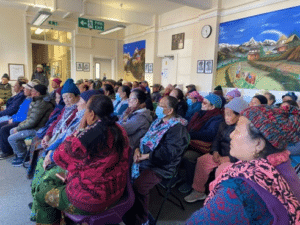 Participants of the survey at the FNC Centre
Participants of the survey at the FNC Centre
The research
The community researchers collected data from their community members through a survey of 103 people and video interviews with 7 participants with a focus on older community members. The survey was conducted face-to-face in Nepalese because of limited proficiency in English. This also enabled the researchers to explain the cost-of-living crisis as there is no direct translation in Nepali. The research showed four main areas of impact of the cost-of- living crisis:
1. Impact of the cost-of-living crisis
- Financial struggles: Over 62% of beneficiaries reported changes in their spending habits, with 69% struggling to pay at least one bill, and 18% unable to pay all their bills.
‘I sometimes borrow from [my] relatives due to the decrease in disposable income.’ - Food choices: Rising costs forced beneficiaries to make difficult choices:
‘I want to buy healthy foods, but they are the most expensive.’ - Housing: 80% live as private tenants due to affordability and long waits for social housing. Additionally, 64% receive housing benefits.
2. Mental and emotional well-being
Over 50% said their mental health had deteriorated over the past year, often due to aging, isolation, and family separation. The pandemic exacerbated feelings of isolation and heightened the negative effects of the cost-of-living crisis. ‘I am getting older, and my children are still in Nepal and unable to live with me, which makes me sad.’
3. Supporting dependents in Nepal
Despite their financial struggles, 80% of participants send money to relatives in Nepal, with 32% supporting three or more dependents. ‘Supporting relatives is a necessity due to the economic situation in Nepal.’
Many hope to bring their children to the UK but face barriers. A participant expressed frustration, saying: ‘My child’s application has been rejected four times. I feel disregarded by the country [I] fought for as a Gurkha.’
4. Access to healthcare
More than 60% found it hard or very hard to access NHS services. Key challenges included language barriers and reduced in-person consultations. Participants noted that face-to-face interactions with health professionals were more effective before the pandemic. ‘There should be someone who can translate face-to-face and is easy to access.’
 Participant prior to survey
Participant prior to survey
Responding to research with shifting priorities
The research helped the FNC centre to prioritise their services and activities to better support their community.
‘From the research findings, I could understand our beneficiaries in a better way, their priorities, their concerns. I was able to plan where we need to focus more, where we need more volunteers or staff to look after their issues and concerns and how we provide a service.’ – Maha, Folkestone Nepalese Community (FNC) Centre
Fundraising
FNC centre works with an external fundraiser to apply for funding and with the research findings they have been able to apply for funding to support the needs of their community members based on the evidence. This is supporting the centre to implement their recommendations.
Strengthening relationship with Kent and Medway Integrated Care Board
Through their involvement in the CPAR programme, the community researchers have developed research knowledge and skills to conduct research in their community. One of the ways that they work closely with the Kent and Medway Integrated Care Board (ICB) is through commissioned reports and so, their bolstered research skills has helped to strengthen their relationship with the ICB. This enables their research findings to feed directly into local health services.
More language and digital classes
In direct response to the research findings the FNC centre have increased the number of classes they provide to community members. They realised that one of the major barriers to accessing GP services was poor digital literacy and so they now provide digital referrals five days a week to help community members make appointments and support with e-visas. As part of this work, they are also offering more English for speakers of other languages (ESOL) classes, maths and digital classes every week.
Reflections from researchers
The community researchers are younger members of the community and conducting the research helped them to understand the community and many of the cultural traditions. The research enabled the researchers to connect with the community and bridge the generational gaps.
‘My journey started with anxiousness and hesitations as I had never taken part in a research group before. When I first read about the project, I found the purpose of the research project wonderful. I was able to gain deeper insight into the concerns and struggles of the senior citizens of the FNC. I was also able to meet and learn about different communities from all over England through the other researchers from the cohort.’ – Kanchan, Community Researcher
‘Although it might take some time for the results to arrive, the participants in the research were happy that there was finally someone willing to listen to their unique issues regarding the crisis. Therefore, I’m proud to have at least given them a chance to relay their concerns to those who can tangibly improve their lives.’ – Bijendra, Community Researcher
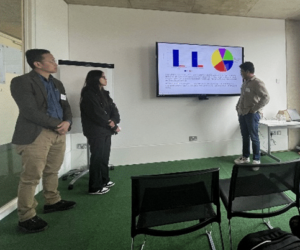
Bijendra, Kanchan and Norbu presenting their finding at CPAR 2 Regional Showcase Event Programme on 6 June 2024
Heating, eating, or care: The difficult choices of the disabled and their carers
Independent Lives is a disability charity based in Worthing, supporting carers and disabled people across Sussex and in Croydon. Gareth Shephard, Cara Redlitch, and Polly Bishop worked on the research project together, titled ‘Pressure points: Experiences of the cost-of-living on disabled people and carers in Sussex’.
The research
The researchers found the research to be a valuable opportunity to consult with people who were quite often hard to reach. Their research focused on how the cost of living is impacting disabled people and carers. From the beginning, they involved disabled people and carers in the development of the project to help guide the process. They created a steering group of professionals and disabled people and carers to make sure to include people’s opinions into their work and help to shape it.
They surveyed people across Sussex and conducted further in-depth interviews to find out about their experience. The community researchers produced several outputs with the research findings including a research report, videos of conversations with the community members and an audioscape. These outputs aim to be as accessible as possible, encompass a wide range of learning styles, and have helped to share the findings in participants own words:
‘It’s impactful to spend a few minutes watching one of the videos on our website and hearing people’s stories in their own words. People have shared really incredible stories with us.’ – Polly Bishop, Community Researcher
Heating, eating, or care
42% of participants reported difficulties in affording heating, and 36% have changed their eating habits. Many must choose between essential needs, leading to significant health risks.
‘I have noticed that the prices of everyday essentials, such as groceries, gasoline, and utilities, have increased significantly. This has made it more difficult to make ends meet and has forced me to make some tough choices about my spending.’
Mental health
Financial stress and social isolation have worsened mental health issues. 80% of participants reported an impact on their mental health due to financial constraints, such as worrying about putting the heating on or putting food on the table. When times are tough people want to be consulted on what’s going on for them and when things can’t happen, they want to know why. They’d like an explanation, and they’d like to really understand what’s going on for them. The state has a role to play in consulting with people experiencing challenges with mental health.
‘This is also affecting my mental health problems. I can’t afford much food. I can’t afford to take my car anywhere, which I need to get about, because I can’t afford to run it, which means I’m not able to do anything socially.’
Feeling trapped
Many disabled people and carers feel trapped by financial limitations, preventing them from taking part in everyday activities and worsening their quality of life. Participants felt that being a disabled person or a carer means they have additional costs that other people don’t have.
People spoke about having medical conditions that meant that they needed to use additional water, put the heating on more often or use a lot of electricity because they were using machines to support their disability. Other people spoke about having to miss supplementary healthcare appointments that they were previously able to afford and helped them to keep their condition manageable, but now are unable to afford. This can also impact their ability to work.
‘Having to cut back on heating is the biggest impact but also my son has a very restrictive and expensive diet and he can no longer have all the food he loves.’
Surviving, not thriving
Most participants say they are merely surviving, unable to invest in their health and happiness due to financial strain.
‘I can’t afford many essentials and I have to go without. I work and can’t get ahead in any way. It’s grinding, distressing and extremely discouraging – it’s impossible to think things will ever get better.’
Recommendations
Independent Lives identified several recommendations from the research findings:
1. Benefits support
Suggestions include increasing Disability Living Allowance (DLA), Personal Independence Payment (PIP), and Carer’s Allowance. Some participants call for specific financial support such as additional cost-of-living payments or adjustments to existing benefits.
‘Carers allowance is insulting it is so low. This needs to be increased to pay carers the minimum wage at least for the hours they spend caring.’
2. Living expenses
Gas and electric prices should be capped for those who have to stay home caring. There should be assistance with daily living costs: help with heating, food (including food bank vouchers and food stamps), and other essentials like transport and specific dietary items.
‘I used to get a warm home discount on my heating bills, but no longer receive this.’
3. Health and social care
Fund more affordable health services and better social care. Cap care contributions, prioritise rehabilitation and family services, and give more weight to doctors’ opinions in the healthcare system. Stop benefit cuts and simplify the application processes for benefits which many find cumbersome and stressful.
4. Discounts and concessions
Participants suggest various forms of discounts on things like public transport, social activities (cinema, eating out), and necessary services like MOT costs.
‘If I only give one recommendation today, it would be that when things are hard for services, we really need to put a key focus on mental health and supporting people. We all know we can’t summon money out of thin air but making sure that we can support people when they’re having difficult times, and helping them get through it as best we can is really important.’ Polly Bishop, Community Researcher
Creating a positive future for ethnically diverse and migrant community members
Diversity Resource International (DRI) C.I.C. is a community interest company, founded in 2004 and working with ethnically diverse communities ever since. The organisation has become a bridge between private and public sectors that are interested in working with diverse communities from different backgrounds. They have a holistic approach to working for equity that is based on the lived expertise of the founders and staff who have been living and working for over two decades within Sussex. The staff is 100% migrant or ethnically diverse and works directly with communities to inform their continued work and approaches. Aabha Gupta, Maria Tayao, Tacye Turner were the community researchers that produced this report, ‘Cost-of-Living Impacts on the Quality-of-Life for Refugees, Asylum Seekers and Migrants’.
The research
DRI believes in community-led and solution-focused research. They want community members and decision-making stakeholders to sit at the same table to bring about change. DRI’s research looked at the compounded impact of the cost-of-living crisis on ethnically minoritised community members and focused on the quality of life for community members, including those seeking asylum and migrants. They also examined how cost-of-living and mental health play a role for ethnically diverse men, and the impact on medical costs, specifically. They used mixed methods and collected 88 responses to a 15-question survey, and then conducted interviews with seven individuals from the survey to further understand their perspectives.
Their research had the following key findings:
1. Barriers to accessing healthcare
Healthcare was the most significant service barrier, with 60% of respondents reporting difficulties. The cost-of-living crisis has strained services, particularly for new migrants and older populations.
‘It’s really hard for me to reach the GP, and there’s no urgent care when I have an emergency.’
2. Mental health and wellbeing
Mental health issues are widespread, exacerbated by housing, healthcare, and employment struggles. Women were more likely to seek formal support, but stigma remains high, particularly among men.
‘As we are single males, we don’t really talk with each other, and it’s shown as a sign of weakness.’
3. Housing as a critical issue
Some 42% of respondents found housing harder to access, with significant mental health impacts due to overcrowding and poor conditions. Younger people and families are particularly affected.
‘None of us have any privacy and no space. How can a husband and wife live in the same room as their teenage daughter? It’s not healthy.’
4. Employment challenges
Employment was a significant concern for 45% of respondents, particularly younger individuals and those facing restrictive visa policies. Many struggle with job stability and qualification recognition.
‘Due to the new policy under the Skilled Worker Visa route, the salary requirement is now higher…opportunities are drifting further away.’
5. Coping strategies highlight financial vulnerability
Many respondents rely on savings or borrow more to cope with rising living costs. This reflects greater financial vulnerability compared to national averages, particularly among newer migrants.
‘I am using my savings, but it’s hard when I don’t have any other options.’
6. Limited access to physical and social activities
Lack of affordable physical and social activities significantly affects the quality of life, particularly for older people and asylum seekers. These activities are seen as essential for mental and physical wellbeing.
‘I like going to the gym, but I would need to pay a monthly allowance to do so.’
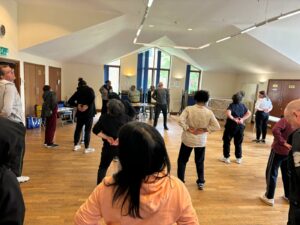
Participants at a workshop
Putting research into practice
DRI have begun to implement some of their recommendations and turn their research into practice. Here are two examples they shared with us:
Health and wellbeing workshops
DRI have hosted five health and wellbeing workshops in 2024 across East Sussex. These were accessible information hubs where speakers from different service providers come together alongside community members to make services more accessible. They are usually on the weekends with childcare support available and interpreters on site. The workshops provide very effective signposting because community members need far fewer steps to get information.
Connecting bilingual residents with interpreting courses
DRI have been working to connect bilingual residents with interpreting courses to enable them to become self-employed. They have put a total of 21 bilingual residents within the Wealden, Eastbourne and Lewes districts into their level three community interpreting course with funding from the organisation 3VA (through their Homes for Ukraine programme). Facilitating skilled individuals to receive training that uses their skills, including their language skills, is really an avenue for people to support their own communities. They can make services acceptable, accessible and inclusive, and together this empowers them to lead their communities to build thriving lives in Sussex.
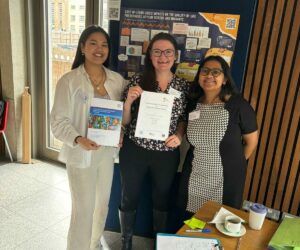 Community researchers at the showcase event
Community researchers at the showcase event
Recommendations and next steps
An integration programme
DRI proposes to lead in the coordination of an integration programme. If comprehensively funded, DRI can coordinate the logistics, including venues, experts and partner resources to deliver effective programmes or even signpost community members at the right moment. Their research shows that a cohesive programme covering the following areas will have a massive positive effect on the futures of our ethnically diverse and migrant community members:
English programmes
The English language is the major barrier to integrating into Sussex. DRI runs several different English programmes and would like to continue them or even widen them. They are tailored to different group’s needs and are inclusive with a holistic approach.
Financial literacy training
People who had an understanding of financial literacy and of the UK systems had the ability to withstand a cost-of-living crisis better than those who hadn’t received that information earlier on. DRI propose to incorporate financial literacy information trainings into their integration program.
Trauma-informed care
Unfortunately, this is a need that affects how someone is able to successfully integrate into Sussex, because a lot of their beneficiaries are coming from countries that are experiencing conflicts. The migration, asylum seeking, and refugee journey could be traumatic in and of itself. Even with a successful outcome, people can be separated from their family, and that can be traumatic. Trauma-informed care should be incorporated and held as a thread throughout the integration programme.
Access to services
While many organisations are working in this area, DRI’s research revealed some key moments where they can target facilitating access. There are different ages and moments in someone’s integration journey, where this might be really effective, and DRI is experienced in doing that facilitation.
Physical and social activities is an essential need
This is one of the first things that people cut during a cost-of-living crisis, and also negatively impacts on people’s mental health and therefore other areas of their life. DRI propose that social and physical activities are an essential part of the integration programme.
A more diverse and equitable workforce
DRI’s second recommendation focuses on creating a more diverse and equitable workforce. While it might sound like a long-term recommendation, there are priority shifts that need to happen early to develop an inclusive society that benefits all of us. DRI challenges the notion that some groups are ‘hard to reach’ as they believe that no one is hard to reach with the right mechanisms in place. If budgets and planning account for a robust outreach, this can incorporate a diverse workforce like the community outreach workers that support DRI’s work. Another way to shift towards a more diverse and equitable workforce is to use the language skills that their communities come with. DRI, wants to see all service providers be able to provide interpretation support and to be inclusive of those who face the language barrier in the UK, and this can be done through training opportunities like the community interpreting course.
Easing the burden for people with dementia and their carers
Lesley Barton and Katie Dobbs from Recapture Lifes’ research focused on examining the impact of the cost-of-living crisis on individuals living with a dementia diagnosis, their families and unpaid carers.
Key findings
- Significant financial burden of care, which affected individuals and their families’ everyday spending, decision making and overall quality of life. A quote from one of their interviews: ‘All I do is exist. I was so stressed mentally and physically that I got to the stage of considering suicide.’
- Emotional and physical toll on unpaid carers, who often had to prioritise essentials over personal well-being and hobbies, with some dedicating more than 100 hours per week to caregiving. Some quotes from their impactful conversations with the community: ‘I’ve not had time for myself, he’s with me, following me every minute of the day.’ ‘I no longer have the same relationship with my wife and feel that I’ve lost her.’
- Disproportionate financial impact on individuals with young onset dementia, who faced limitations in their personal and professional lives alongside limitations on their ability to plan for the future and engage in fulfilling activities. ‘Young onset dementia individuals are often risk averse and unable to engage in fulfilling activities due to their condition.’
Tangible steps toward better dementia care
Since completing their research, the community researchers have taken the following action to influence and address the challenges faced by individuals affected by dementia, and their carers:
Preserving support groups
Recapture Life successfully prevented the closure of two well-attended support groups in Fareham and Havant Boroughs, which were at risk due to changes in County Council contracts.
Cookery courses for carers
They have introduced four six-week cookery courses, working with Coral’s Cookery School for unpaid carers, addressing the shift in household roles, while also providing a safe space for their loved ones to be taken care of while their carers learn new skills. In October 2024, they launched similar courses for individuals with dementia in collaboration with the students at Fareham college, which has been a success both in delivery and partnership working.
Equine and other therapeutic initiatives
Recapture Life has facilitated equine therapy sessions with Dementia Friendly Hampshire and actively participated in the Raising Voices research programme through Action Hampshire. Lesley is currently preparing to present their idea at an upcoming showcase, focusing on researching a toolkit to help people turn their solutions into reality for the VCSE sector.
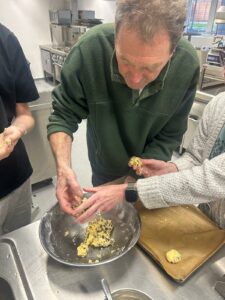
A carer at a cooking class
Vision for the future
Looking to the future and the changes they would like to influence:
Community space initiative
Recapture Life is working towards establishing a community space that offers various support services and activities under one roof. They have received support from the Portsmouth City Council for their application to a funding bid.
‘Our vision is to have a community space for advice, support groups, cognitive stimulation therapy, and various activities like gardening and cooking.’
Research on mental health of carers
Recapture Life is collaborating with Dr. Nuno Tavares from Portsmouth University on a research programme to support the mental health of carers, including a volunteering programme for former carers to support current ones.
Enhancing break services for carers
Recapture Life are keen to work with the Hampshire County Council’s take-a-break service and are proposing cognitive stimulation therapy sessions as an alternative to the current take a break service offered by domiciliary care providers with the aim to provide better stimulation and social interaction for the individual with dementia while giving more flexibility to the carer at lower costs.
Their message to stakeholders:
‘We’d love you to work with us. We’ve got lots of ideas, and we really would like to support your work impacting carers who are caring for those with dementia.’
Community research can generate actions and change
Oxford Community Action (OCA) formed in 2018 to support new and emerging Black and Minoritised communities alongside more established communities to tackle and overcome barriers created by structural inequalities (e.g. labour market and ethnic health inequalities). These barriers prevent individuals and communities from reaching their full potential and enjoying equal representation and participation as active citizens within UK institutions and wider civil society. OCA provides a community food support service in East Oxford for up to 300 people a week. Two members of OCA, Hassan Sabrie and Mujahid Hamidi, focused on this service and conducted the research from May 2023 to June 2024.
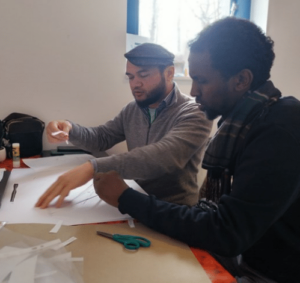
Community Researchers, Hassan Sabrie and Mujahid Hamidi doing data analysis
The research
Hassan and Mujahid’s research aimed to understand how the rising cost of living affects people in the East Oxford community, especially in accessing food. It explored why people use food support services, the challenges they face, and what improvements could help them. The goal was to share these findings with decision-makers and find practical ways to support the community better.
Key findings of their research
Food support is essential for coping with the cost-of-living crisis
Access to community food services is critical for families struggling with financial pressures, particularly as they face difficult choices between expenses like food and heating.
- 73% of respondents said food services save them money.
- 35% noted it helps them feed their families.
‘We would starve on several days a week – we truly struggle without them.’
Community connection and mental wellbeing
Food distribution services foster a sense of belonging, combat isolation, and improve mental health for users and volunteers alike.
- 21% mentioned food services supported their health and mental health.
‘It makes me feel that I matter to other people in the community.’
Challenges with food quality and cultural appropriateness
Some respondents noted gaps in the cultural and nutritional suitability of food offerings.
- 37% said there is insufficient cultural food choice.
‘It would be good to have more variety or information about what’s available.’
Interest in community food growing
- Nearly half (49%) of respondents expressed interest in food-growing projects to promote self-sufficiency, community building, and mental well-being.
‘…it would be therapeutic to grow my own food and be out in nature.’
Recommendations and actions
From their research, they highlight the following key recommendations for local stakeholders:
Developing a social supermarket
OCA wanted to create a social supermarket to address the lack of product variety, affordability, and availability of culturally appropriate foods for their community. They reached out to Good Food Oxfordshire and Feeding Britain to learn from their experiences and design a model tailored for their needs.
‘Within our food redistribution service, people found that there wasn’t a large range of products available, and the ingredients that they might be familiar with were not really there.’
Establishing a community garden
Hasssan and Mujahid partnered with Community Action Groups Oxfordshire to identify an allotment and establish a community garden. This was after they trialled a proof of concept in Hassan’s back garden growing lettuces, tomatoes, beans and onions with community members. Community Action Groups Oxfordshire will help to empower the gardening communities with skills and opportunity to grow their own food.
‘They already have the expertise of how to grow their own food, but they didn’t have access to their own garden or any piece of land or even equipment.’
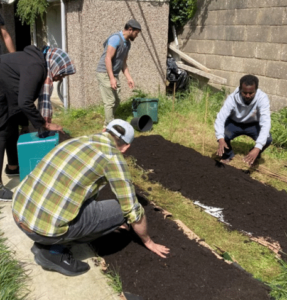
Community members getting the community garden ready
Launching on-site advice services
OCA wanted to support their community members with many of their other issues such as housing, debt and employment that are not easily resolved. They contacted the Agnes Smith Advice Centre and shared the feedback from their research. Together they developed a pilot project to provide outreach advice on housing, employment, and financial matters directly at the food redistribution service every week. The service is bespoke and is intended to bring accessible, culturally sensitive support to the community rather than expecting individuals to navigate to external services.
‘This is only possible because of all the conversations that we’ve had, all the groundwork that members of OCA have done over the years with the community, to build trust amongst the community. Our community members can easily open up to us with their issues and allow us to help resolve these issues.’
Communities want action, not research
Hassan and Mujahid emphasised that communities are tired of research – they want to see actions being implemented. As community researchers they have an advantage over academic researchers in that they are working with the community to understand the problems but also to act together.

Community members who participated in the research and its actions
Innovative data presentation towards community-centred healthcare
Wellsbourne Healthcare CIC was established in 2018 in East Brighton and it represents an innovative approach to healthcare, emphasising the broader social determinants of health. Unlike traditional GP practices, Wellsbourne operates as a community interest company, allowing it to invest more directly in local community initiatives and focus on holistic well-being. This structure supports a variety of projects, including community gardens and mental health programs, with staff roles extending beyond conventional medical practitioners to include mental health and focus care practitioners.
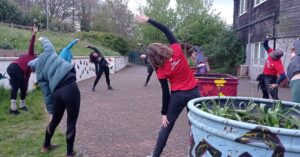
Well-being activities with communities
The research
Keith Turner and Lucy Mitchell’s research aimed to understand the impact of the cost-of- living crisis on health and opportunity in the communities of Manor Farm, Bristol Estate and Whitehawk in East Brighton. They have attempted to validate community experiences with data, with a particular emphasis on understanding community experiences and identifying effective local support mechanisms. Key research questions included:
- How has the cost-of-living crisis affected health in the community?
- What concerns do residents have for the future?
- What types of community support have been beneficial?
Their key findings highlighted significant challenges faced by the community:
Lack of opportunity
Many residents reflected that they had ‘a feeling of being left behind’ in an economy that increasingly marginalises those without resources to improve their circumstances. Particularly, there was a worrying lack of opportunity and resources for younger people (ages 18-29), with 100% of respondents in this age group expressing concerns about their future.
Impact of the crisis on daily choices and essentials
89% of respondents reported changes in their shopping and eating habits due to financial constraints, and 25% struggled to afford over-the-counter medicines. These changes highlight the difficult compromises residents must make between health and basic essentials, which affects their long-term well-being.
Sense of dependency and diminished self-worth
Many individuals expressed that constant reliance on food banks and social services left them feeling undervalued and in crisis, creating a cycle of instability without a clear path forward: ‘People just seem to be in crisis all the time.’
Mental health concerns and hopes for the future
Among participants aged 18-29, 100% indicated that the crisis had adversely affected their outlook on the future. This sense of stagnation presents a barrier not only to individual growth but also to community resilience: ‘People want to work, to improve, to build something – but they’re stuck.’
Innovative data presentation
In an effort to make the research accessible, Keith and Lucy employed various methods of data visualisation. In addition to traditional bar and pie charts, they utilised a multisensory approach stressing their commitment to accessibility and inclusivity in research. They employed:
- Tactile data representations, enabling people to feel the weight of survey responses using rice-filled bags corresponding to the degree of concern or worry expressed.
- Data sonification to convey findings through sound, creating a piece where high notes represented severe dissatisfaction, allowing listeners to engage with the data emotionally and intuitively.


Examples of innovative and tactile data representation
Recommendations
From their research, they highlight the following key recommendations for local stakeholders:
1. Longer term funding and collaboration: Despite numerous local initiatives, such as gardening sessions, creative workshops, regular crafting & creative storytelling projects, there is a pressing need for sustainable funding to maintain these valuable resources. The Wellsbourne’s Health & Wellbeing Café is another example of local initiatives currently in place. It has regular sessions on health concerns faced by the local community and well-being patients on topics like falls prevention, hypertension, diabetes with blood tests, benefits advice, how to stay warm, healthy eating on a budget, etc. Short-term funding hinders the ability to build lasting relationships and embed initiatives within the community:
‘There is a need for longer-term funding solutions and greater collaboration among local organisations to create more stable and effective support networks.’
2. Create opportunities for young people: Recognise and actively work to create opportunities for young people aged 18-29, with many desiring work, business opportunities, and financial
stability but lacking pathways to achieve them. Engage young people through creative,
therapeutic activities that allow for skill-building and social connection, such as cooking
classes and community gardens, which promote social support and skill exchange.
3. Expand social prescribing and non-traditional support roles: Utilise social prescribing more widely and provide resources that address non-medical factors of well-being. Expanding roles like social prescribers and community mental health practitioners can address the complex needs communities face, like food security and skills development:
‘Social prescribers are addressing issues around the food bank, trying to provide people with resources beyond just medical support, like food vouchers and connections to community activities.’
4. Have community-centered healthcare models that address both immediate health needs and the underlying social and economic factors that shape health outcomes. This approach not only supports individual well-being but also fosters stronger, more resilient communities. For example Wellsbourne Healthcare CIC has a strong focus on the broader social determinants of health, and the fact that in this very underserved community,
‘A lot of the things that are going to impact on people’s health are more than what any of us could do as GPs.’
5. Recognise the need for Minimum Income Standard (MIS): In order to live well in the UK, work needs to be paid at a better rate so that those working a full week can more than survive, and those who cannot work or cannot find work will be supported so that they can also do more than just exist. This will help improve the health and wellbeing and provide equality of opportunity to such disadvantaged communities as East Brighton and the many others throughout the UK.
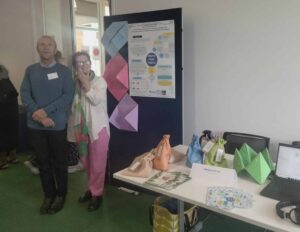
The researchers were the second cohort of the Community Participatory Action Researcher (CPAR) programme run by the South East School of Public Health – part of NHS Workforce, Training & Education (WT&E) in partnership with the Scottish Community Development Centre (SCDC), the University of Reading and Institute for Voluntary Action Research (IVAR).
